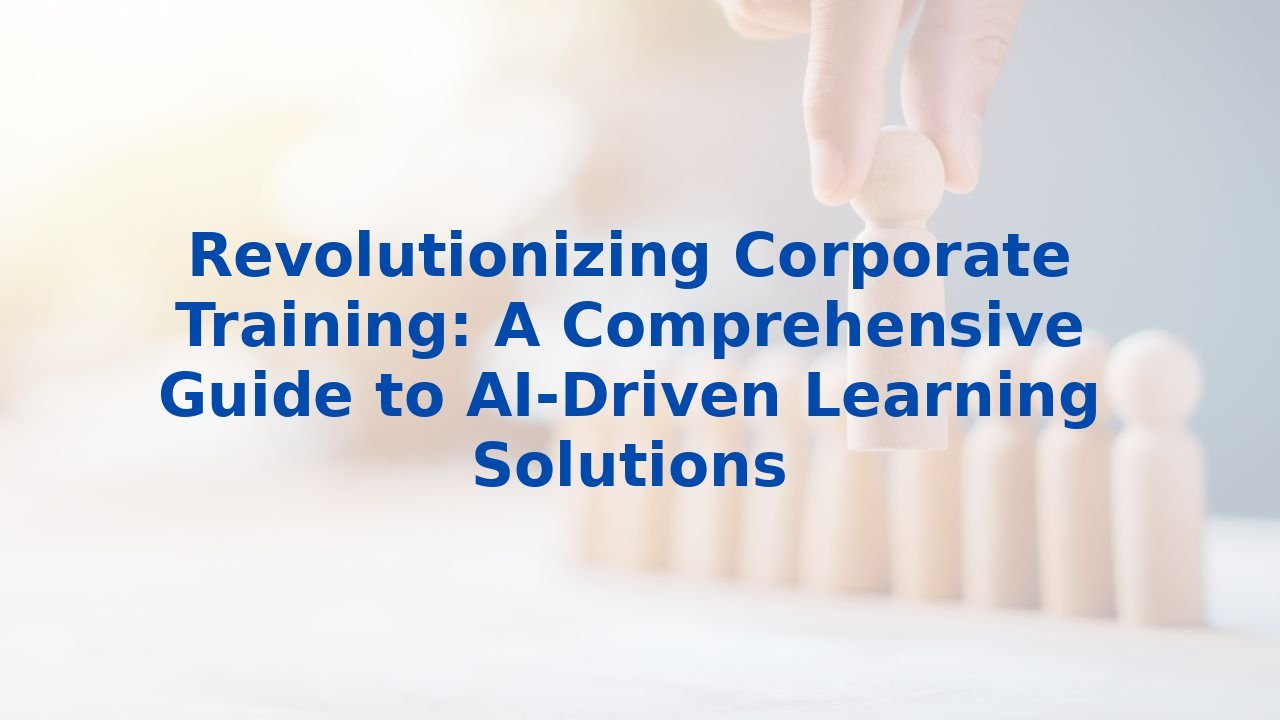Revolutionizing Corporate Training: A Comprehensive Guide to AI-Driven Learning Solutions
Revolutionizing Corporate Training: A Comprehensive Guide to AI-Driven Learning Solutions
Introduction
In the relentless whirlwind of today’s business landscape, corporate training has transcended its previous role as a mere necessity; it has become an integral part of an organization's success. Companies are not just looking at how much they can invest in training but rather how they can maximize their returns. The introduction of Artificial Intelligence (AI) has created a seismic shift in corporate training dynamics, providing organizations with groundbreaking tools to enhance efficiency, engagement, and overall performance.
The Impact of AI on Corporate Training
AI's role in corporate training is profound. By automating mundane tasks and providing tailored learning pathways, it transforms the learning experience. Here’s how AI is augmenting corporate training processes:
1. Cost Reduction and Time Efficiency
One of the most compelling advantages of integrating AI into corporate training is its ability to significantly reduce training costs while enhancing efficiency. Conventional training often comes with hefty expenses – think physical spaces, instructor fees, printed materials, and more. In stark contrast, AI-powered solutions can slash these costs and eliminate administrative burdens. Organizations can see savings of up to 30% on training expenses, allowing them to invest more resources into their core operations.
2. Effective Content Creation
Traditionally, content creation for training programs was a tedious and time-consuming process. However, AI equips organizations with tools that can craft engaging training materials swiftly. From chatbots and video generators to infographic creators, companies can produce dynamic and relevant content that captivates learners, thereby maximizing the impact of the training provided.
3. Streamlined Onboarding Training
AI solutions are a game-changer for onboarding new employees. Conversational AI tools act as mentors, offering new hires a seamless integration into the company culture and processes. This technology doesn’t just enhance engagement; it tracks progress and identifies where mentoring is needed, leading to a whopping productivity boost of 34% for novice employees.
4. Personalized Learning Experience
Gone are the days of a one-size-fits-all approach to training. AI allows for tailored learning experiences based on individual strengths, weaknesses, and career ambitions. By designing personalized learning pathways, organizations not only ensure employees are trained in relevant areas but also enhance job satisfaction, creating a more motivated workforce.
5. Scalability and Continuous Learning
AI enables organizations to effortlessly scale training initiatives, reaching larger audiences without significant additional costs. Beyond scaling, these platforms encourage continuous learning by tracking progress and pinpointing skill gaps. Employees receive curated content tailored to their needs, ensuring they are always positioned at the cutting edge of their field.
6. Enhanced Support and Performance
Efficiency thrives on support. AI offers immediate assistance, allowing employees to navigate training programs intuitively. With real-time support from AI chatbots, learners can tackle challenges head-on without wasting valuable time. This concentrated focus on priority tasks ultimately leads to improved business outcomes.
Benefits of Training Employees for AI
A pivotal component of this AI revolution is ensuring employees possess the know-how to harness its potential. Training the workforce on AI applications fosters numerous advantages:
- Increased Productivity: By automating repetitive tasks, AI allows employees to redirect their efforts toward strategic initiatives, significantly enhancing productivity.
- Improved Decision-Making: AI empowers employees with actionable insights, leading to well-founded, data-driven decisions.
- Enhanced Engagement: Familiarity with AI tools boosts employees' engagement, as they become enthusiastic participants rather than passive learners.
Key Considerations for Implementing AI in Corporate Training
While the benefits are enticing, there are critical considerations to keep in mind during implementation:
- Legal and Ethical Use: Approach AI with a keen focus on fairness and impartiality. It's vital to minimize discriminatory outcomes.
- Data Protection: Prioritize cybersecurity protocols to safeguard sensitive data acquired through AI systems.
- Integration with Existing Systems: Seamless integration with current infrastructures is essential to avoid disruptions and maintain workflow.
- User Training: Invest in training sessions for employees to ensure they can effectively leverage AI solutions, maximizing the overall benefits.
Conclusion
In conclusion, AI is not just a buzzword; it's a transformative force in corporate training. By streamlining processes, enhancing efficiency, and providing personalized experiences, AI paves the way for organizations to thrive in a competitive market. As businesses continue to embrace artificial intelligence in their training strategies, they can anticipate profound improvements in productivity, retention, and overall organizational success. It’s imperative that companies invest in training their employees on these tools to fully leverage the potential of AI and drive innovation onwards.



